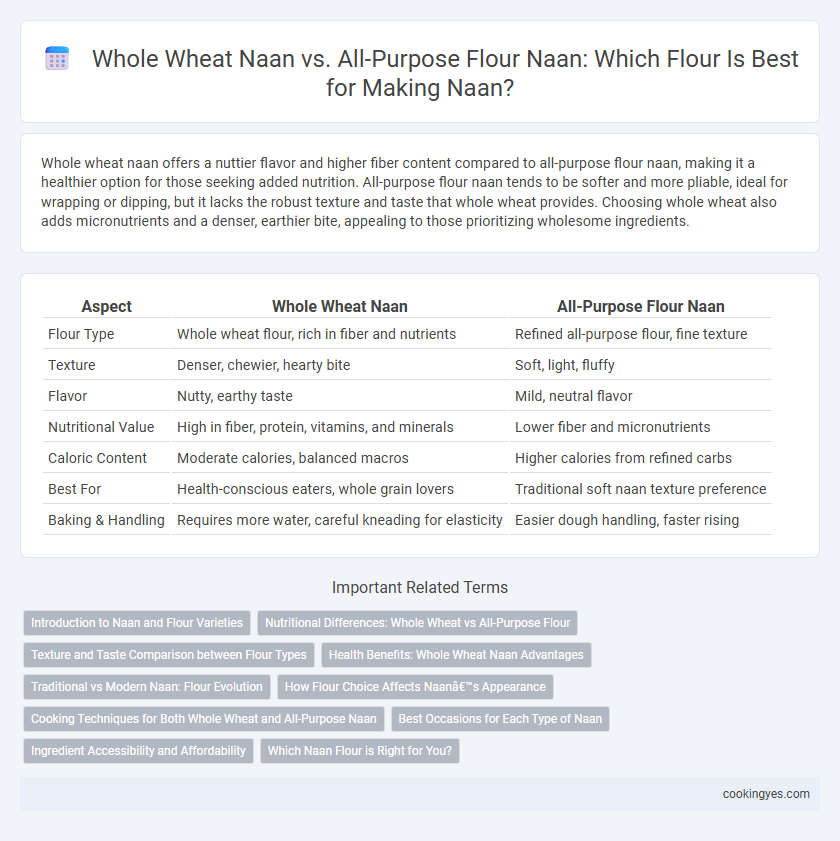Whole wheat naan offers a nuttier flavor and higher fiber content compared to all-purpose flour naan, making it a healthier option for those seeking added nutrition. All-purpose flour naan tends to be softer and more pliable, ideal for wrapping or dipping, but it lacks the robust texture and taste that whole wheat provides. Choosing whole wheat also adds micronutrients and a denser, earthier bite, appealing to those prioritizing wholesome ingredients.
Table of Comparison
| Aspect | Whole Wheat Naan | All-Purpose Flour Naan |
|---|---|---|
| Flour Type | Whole wheat flour, rich in fiber and nutrients | Refined all-purpose flour, fine texture |
| Texture | Denser, chewier, hearty bite | Soft, light, fluffy |
| Flavor | Nutty, earthy taste | Mild, neutral flavor |
| Nutritional Value | High in fiber, protein, vitamins, and minerals | Lower fiber and micronutrients |
| Caloric Content | Moderate calories, balanced macros | Higher calories from refined carbs |
| Best For | Health-conscious eaters, whole grain lovers | Traditional soft naan texture preference |
| Baking & Handling | Requires more water, careful kneading for elasticity | Easier dough handling, faster rising |
Introduction to Naan and Flour Varieties
Whole wheat naan offers a richer fiber content and a nuttier flavor compared to all-purpose flour naan, making it a healthier option for many consumers. All-purpose flour naan provides a lighter, softer texture that is traditionally preferred for its airy and fluffy qualities in Indian cuisine. Choosing between whole wheat and all-purpose flour depends on desired texture and nutritional benefits, with whole wheat contributing to a denser, more wholesome bread experience.
Nutritional Differences: Whole Wheat vs All-Purpose Flour
Whole wheat naan contains more fiber, vitamins, and minerals than all-purpose flour naan due to the retention of bran and germ in whole wheat flour. This higher fiber content promotes better digestion and sustained energy release, making it a healthier option for blood sugar management. All-purpose flour naan, while softer and more pliable, is lower in nutrients and higher in refined carbohydrates, leading to quicker spikes in blood sugar levels.
Texture and Taste Comparison between Flour Types
Whole wheat naan offers a denser, heartier texture with a slightly nutty flavor, while all-purpose flour naan tends to be lighter, softer, and more pliable with a mild taste. The higher fiber and bran content in whole wheat flour contribute to a chewier bite, enhancing the rustic experience. All-purpose flour's refined nature produces a fluffier naan, making it ideal for absorbing sauces and complementing rich curries.
Health Benefits: Whole Wheat Naan Advantages
Whole wheat naan offers superior health benefits compared to all-purpose flour naan due to its higher fiber content, which aids digestion and promotes satiety. It contains more essential nutrients such as vitamins B and E, minerals like magnesium and iron, contributing to improved heart health and better blood sugar control. Choosing whole wheat flour for naan enhances its nutritional profile, making it a healthier option for those seeking balanced, nutrient-rich meals.
Traditional vs Modern Naan: Flour Evolution
Whole wheat naan retains a traditional essence with its denser texture and higher fiber content, reflecting the age-old use of whole grains in Indian cuisine. All-purpose flour naan embodies modern adaptations, offering a softer, lighter bite favored for its balanced gluten development and ease of fermentation. The flour evolution from whole wheat to all-purpose flour highlights a shift towards refining naan's texture while maintaining its authentic flavors.
How Flour Choice Affects Naan’s Appearance
Whole wheat naan typically has a denser texture and a darker, more rustic appearance due to the bran and germ content in the flour, which also adds a slightly coarse surface. All-purpose flour naan appears lighter, with a soft, fluffy texture and a smooth, pale golden finish from the refined flour's fine particles. The higher gluten content in all-purpose flour contributes to greater dough elasticity, resulting in naan that puffs up more prominently when cooked.
Cooking Techniques for Both Whole Wheat and All-Purpose Naan
Cooking techniques for whole wheat naan involve longer kneading and resting times to develop gluten and achieve pliability, while all-purpose flour naan requires less rest due to higher gluten content and finer texture. Whole wheat naan often benefits from cooking in a tandoor or on a hot griddle (tava) to ensure proper heat distribution and a slightly denser texture, whereas all-purpose flour naan puffs up quickly with direct high heat, creating a softer, airier bread. Both types require brushing with ghee or butter post-cooking to enhance flavor and retain moisture.
Best Occasions for Each Type of Naan
Whole wheat naan offers a hearty, fiber-rich option ideal for health-conscious meals or pairing with robust dishes like lentil soups and grilled meats. All-purpose flour naan provides a soft, fluffy texture perfect for indulgent occasions such as special family dinners or festive celebrations with rich curries and creamy sauces. Choosing between whole wheat and all-purpose flour naan depends on the desired nutritional benefits and the flavor profile of the accompanying dishes.
Ingredient Accessibility and Affordability
Whole wheat naan offers a more accessible and affordable option compared to all-purpose flour naan, as whole wheat flour is commonly available in most grocery stores and often costs less due to its less refined processing. The higher fiber content in whole wheat flour also provides added nutritional benefits without significantly increasing the price or complexity of ingredients. Choosing whole wheat flour supports budget-friendly cooking without sacrificing the traditional soft texture associated with naan bread.
Which Naan Flour is Right for You?
Whole wheat naan offers a denser texture and higher fiber content, making it a nutritious choice for those seeking more dietary benefits. All-purpose flour naan yields a softer, lighter, and more traditional texture, perfect for those prioritizing a classic taste and fluffy consistency. Choosing the right flour depends on whether you prefer health-focused whole grain qualities or the softer, delicate mouthfeel of all-purpose flour.
Whole Wheat Naan vs All-Purpose Flour Naan for flour choice Infographic

 cookingyes.com
cookingyes.com